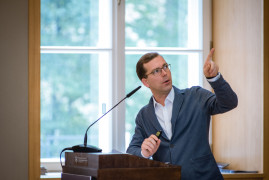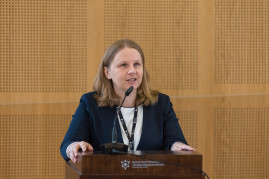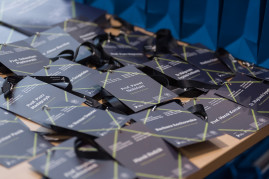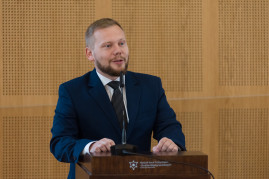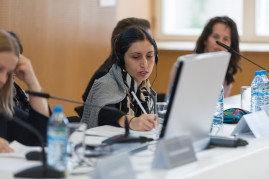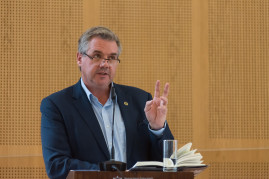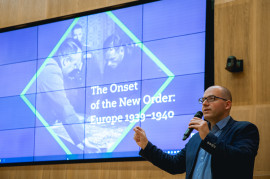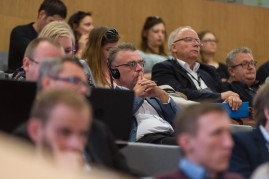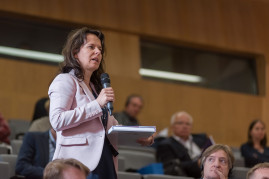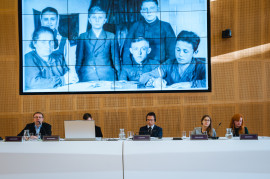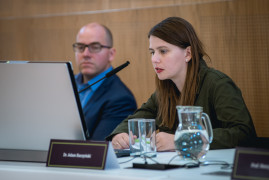The Onset of the New Order: Europe 1939–1940 | International scientific conference - Instytut Pileckiego
conference
17.09.2019 (Tue) 00:00
The Onset of the New Order: Europe 1939–1940 | International scientific conference
The 80th anniversary of the outbreak of the Second World War was an ideal opportunity to focus scholarly attention on this pivotal era of global history.
- 17–19 September 2019
- Faculty of Political Science and International Studies at the University of Warsaw
- Warszawa, Krakowskie Przedmieście 26/28
Between the German invasion of Poland on 1 September 1939 and the spring of 1940, when Hitler shifted his attention to the military campaign against the West, Europe for the first time experienced a form of occupation and total war aimed specifically at the destruction of entire societies, nations, and peoples. It was in Poland that the Nazi New Order for Europe would first begin to be implemented, and where it would be most fully felt – a premonition of what was in store for the whole of Europe. Almost simultaneously, Poland would also experience invasion and occupation by the Soviet Union, beginning a similar process of state destruction, mass deportations and repression. This would soon be followed by Soviet occupation in much of Finland and of the Baltic states. This period may serve as the point of departure for many of the issues touched upon in our research on modern history, and as the basis of our common understanding of the war.
This conference focuses on issues such as the nature of totalitarianism and how it was understood by the governments and peoples of the allied nations in those moments leading up to and following the two invasions. We also aim to explore the effects of total war upon the civilian populations and upon the Jewish diaspora as collective trauma, and how this has shaped our memories and our narratives of this period. The conference also invites debate about our understanding of the modern world, with its rapid military, technological, political and social changes, full of threats and possibilities.
To fully explore these critical events and processes, we have invited scholars from all disciplines, and although our primary focus is on this initial stage of the war, we will also discuss topics that place it in a wider chronological and/or geographical context. While attaching great importance to a study of the historical circumstances of September 1939, we are equally interested in assessing how we formulate our contemporary understanding of the subject through – among others – scholarship, museology, and education.
KEYNOTE LECTURES:
17.09 | Roger Moorhouse: Poland’s Defensive War of 1939: A Bloody Prelude
18.09 | Prof. Marek Kornat: The West’s First Opinions on the September Campaign
19.09 | Prof. Stephan Lehnstaedt: Polenfeldzug: Crimes Committed Against Poland in the September Campaign of 1939 and Their Place in Germany’s Modern Memory
PARTNER: Faculty of Political Science and International Studies University of Warsaw
See also
- Oppositional Engagement of Women in Authoritarian and Totalitarian Systems of the 20th Century: Poland in a Comparative European Perspective (1919–1989)
conference
Oppositional Engagement of Women in Authoritarian and Totalitarian Systems of the 20th Century: Poland in a Comparative European Perspective (1919–1989)
We invite scholars to participate in an international academic conference devoted to various forms of activity undertaken by women who engaged in opposition and dissent under authoritarian and totalitarian rule in the 20th century.
- CALL FOR PAPERS: Oppositional Engagement of Women in Authoritarian and Totalitarian Systems of the 20th Century: Poland in a Comparative European Perspective (1919–1989)
conference
CALL FOR PAPERS: Oppositional Engagement of Women in Authoritarian and Totalitarian Systems of the 20th Century: Poland in a Comparative European Perspective (1919–1989)
We invite scholars to participate in an international academic conference devoted to various forms of activity undertaken by women who engaged in opposition and dissent under authoritarian and totalitarian rule in the 20th century.
- Pilecki Institute International Teachers and Educators Program 5th edition. Post-war decade. | Call for participants
project
Pilecki Institute International Teachers and Educators Program 5th edition. Post-war decade. | Call for participants
Recruitment for the fifth edition of the Pilecki Institute International Teachers and Educators Program has begun. We invite teachers and educators from around the world to participate in the online conference. This year, we are focusing on the history of
